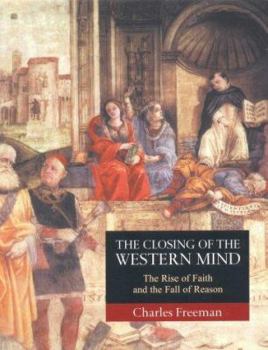The Closing of the Western Mind
Select Format
Select Condition 
Book Overview
A radical and powerful reappraisal of the impact of Constantine's adoption of Christianity on the later Roman world, and on the subsequent development both of Christianity and of Western civilization.... This description may be from another edition of this product.
Format:Hardcover
Language:English
ISBN:0434008532
ISBN13:9780434008537
Release Date:August 2002
Publisher:William Heinemann
Length:320 Pages
Weight:1.70 lbs.
Customer Reviews
3 ratings
Wonderful Book
Published by Thriftbooks.com User , 18 years ago
Many readers will find it easy to misunderstand this wonderful book because Freeman's argument(s) are not congruent with the Hollywood-esque version of history that Americans have embraced as "fact." The three most important arguments are: (1) early Christianity was significanly influenced by political factors; (2) monotheism is hierarchical and thus inherently exclusionary and intolerant, not only of other religions but also of any behaviors or ways of thinking that might challenge the decreed orthodoxy of the hierarchy; (3) as Christianity spread and became an established religion, its foundation on the Gospels became so attenuated as to be almost nonexistent. These arguments are compelling because Freeman possesses truly amazing knowledge of history and the Bible, which enabled him to offer mountains of evidence to support every claim. Those of us who work or are simply interested in history cannot help but experience both admiration and envy in the face of Freeman's mastery of ancient sources. It also is worth mentioning that the book is beautifully written, the style elegant, graceful, and often moving. What a shame that other scholarly books are not as readable! One need only reflect for a moment on the world's situation today and see the relevance of Freeman's arguments: terrorist attacks in the name of Islam, restrictions on stem-cell research in the name of God, efforts in many countries to strengthen the connection between government and religion, and everywhere increasing erosion of freedom of expression and growing intolerance for diverse views. While reading Freeman, I was reminded of Kirsch's God Against the Gods, another book that critically examines the influence of monotheism. Both works ineluctably bring us to an important question that merits consideration: Has monotheism really made the world a better place?
Time very well spent
Published by Thriftbooks.com User , 19 years ago
Charles Freeman has taken an thousand years of ecclesiastical history and formulated a well thought out theory on the impacts of the church on Roman society. For the truly devout, this book may tend to bring to light facts that don't necessarily warm the heart. However, he does relay a strong sense of the times and places all events into their proper context. Freeman has obviously spent painstaking hours in the research and formulation of this book, and in doing so, provides the reader with a vibrant understanding of both the glory and instability of Rome. The Empire itself is shown with all its vulnerabilities, which after "Christianization", seem to waver on the strengths and weaknesses of a developing Christian church. For the unbiased reader, this book is a refreshing insight into an area of Roman history that is commonly overlooked and blindingly waived aside. I recommend this book to any that are interested not only in ancient / medieval history, but in the aspects of ecclesiastical history that seldom are expressed without a slanted sentiment.
Not just rehashed Gibbon
Published by Thriftbooks.com User , 20 years ago
I must disagree with the other reviewer in comparing this book to Gibbon. Rather than asserting that Christianity contributed to the end of the Roman empire, Freeman suggests that Christianity may in fact have preserved it well beyond its sell-by date. It is beyond any reasonable historical doubt that the average citizen of medieval Europe was far more restricted in what their society would allow them to believe and indeed to think about - with the penalties for error being corporal on earth and eternal in the fires of hell.It is certainly true that from a technological point of view, invention did continue throughout the middle ages, but free intellectual & scientific progress was certainly stunted by the church's insistence on reliance on scripture as the only valid source of knowledge, supported by an atrophied smattering of classical texts. Ironically of course the church integrated the very same old masters (esp Ptolemy, Galen and Aristotle) that would have espoused a practical and experimentalist scientific tradition completely at odds with the church's view of reality.Freeman, while clearly an admirer of the classical world (most of his other books have that focus), is far from a church-basher, though once you've read the book you mightn't feel like being so kind. Gregory of Tours and Ambrose of Milan, two pivotal figures of the early medieval church, receive treatments that are fairly balanced (though it is clear that any admiration Freeman has for Ambrose are along the same lines as Machiavelli might have had for Stalin).A really excellent book, especially if want a thorough, thought-provoking, erudite but not overly academic treastise on the late Roman/Early medieval period.





